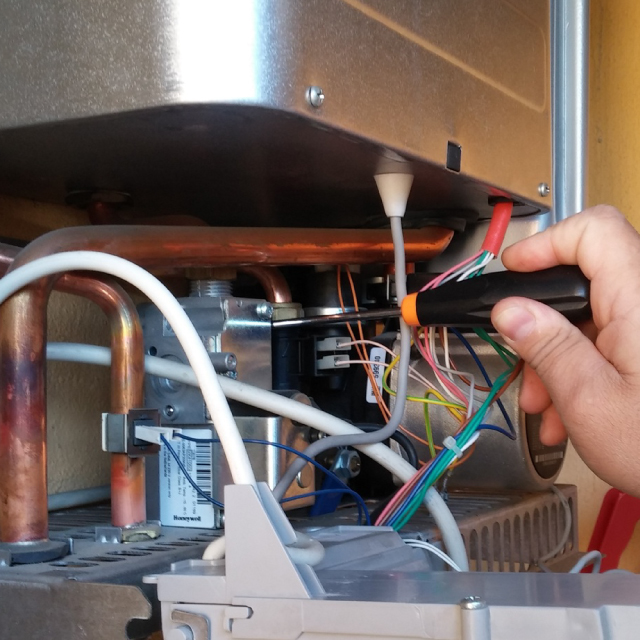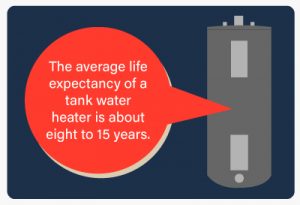
Unexpected splashes of cold water are sure to wake you up in the morning, however, they might not be the best way to start your day. The average life expectancy of a tank water heater is about eight to 15 years. After 10 years, its operating efficiency dramatically reduces, making the appliance more likely to break down. Rather than wait for a catastrophe, you can recognize the signs of a water heater’s last days and avoid the potential damage and disruption.
How can I tell if my hot water heater needs replacing?
1. Water heater age:
Knowing the age of your water heater can help you decide if you should repair or replace the appliance. To determine how old it is, look at the serial number on the manufacturer’s sticker toward the top of the tank. Water heater serial numbers begin with a letter, A through L. These letters represent the month in which the appliance was manufactured. The next two numbers in the series indicate the year it was manufactured. A serial number that begins with C13, for instance, indicates the water heater was manufactured in March 2013. If the appliance is more than 10 years old, it is a good idea to consider a replacement.
2. Strange noises:
Over time, sediment builds up in the tank. As the sediment heats and reheats, it hardens, making the water heater noisy and less efficient. The longer sediment sits in a heat tank, the more wear it can cause as the particles cause the metal to become brittle.This can cause small holes and cracks to develop. If you hear a rumbling or strange noise from your water heater tank, inspect it for small leaks.
3. Rust-colored water:
If you notice a rusty discoloration when running hot water, it may indicate corrosion inside the water heater. However, you might also find rust-colored water if your home is equipped with galvanized pipes. To determine if the water heater is corroded or if the problem is with the pipes, drain about 10 gallons of hot water into multiple five-gallon buckets. If the water still looks rusty when you fill the third bucket, it’s time to look for a new water heater.
4. Water surrounding the tank:
As the inner metal tank heats, it expands. With time, this action can cause small fractures. As the metal cools and contracts, the inner tank will stop leaking. If you notice water on the floor, verify that water is not leaking from the tank’s connections, fittings, or the pressure overflow pipe. If the components are dry, you will need a new water heater soon.
5. Cold water:
Older water heaters are less efficient in heating water and maintaining warm temperatures. If your water is cooler than usual and the water heater is more than eight years old, it might be at the end of its service life.
Selecting a New Water Heater
1. Storage Type
The most common residential water heaters use insulated storage tanks that hold warm water until you need it. Manufacturers classify the tanks by the number of gallons of water they hold, as well as the heater’s recovery rate, which indicates the number of gallons of water it heats in an hour.
Tankless water heaters are another popular option for homes. Rather than storing water in a large tank, water passes through a series of coils that heat the water. Tankless water heaters are generally more energy-efficient than those with tanks as they only heat the water you need.
However, they only provide a flow rate of up to 3.5 gallons of heated water per minute. Tankless models are good for households that don’t use hot water at more than two points at the same time, such as a shower, dishwasher, and washing machine.
2. Fuel source:
Water heaters rely on electricity, gas, or a heat pump to warm the water.
- Electric heaters have the greatest range of sizes and tend to cost less.
- Gas heaters warm up to 100 gallons of water and require air circulation. They are generally more expensive than an electric heater, but more efficient.
- A heat pump, or hybrid, model uses energy from the air to warm the water. While initial costs can be expensive, heat pumps tend to be the most energy-efficient option.
3. Space
Larger water heaters have tanks that are between 50 and 76 inches tall and are best stored in basements or garages. If the height is an issue, short, or lowboy, models offer holding capacities of up to 50 gallons in shorter, wider tanks that are up to 49 inches tall.
Upgrade Your Water Heater Today
Regular maintenance including flushing the water heater will help extend the life of your water heater appliance. If your heater is past its prime, AAA Heating and Cooling offers a variety of traditional models and tankless water heaters that will accommodate your hot water needs, while reducing energy costs. Schedule a free consultation to find a model that best suits your needs.